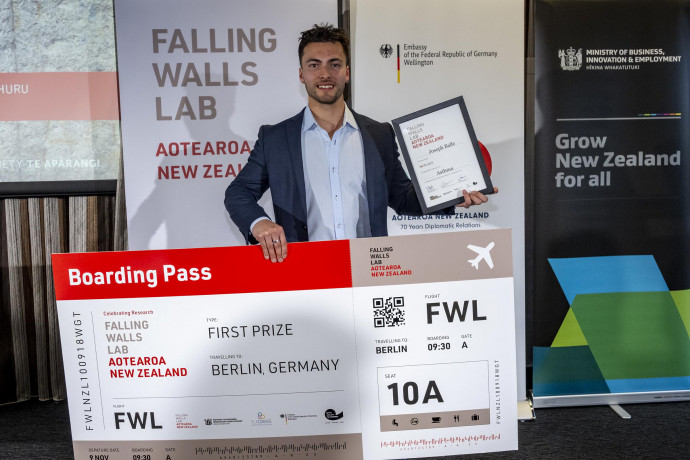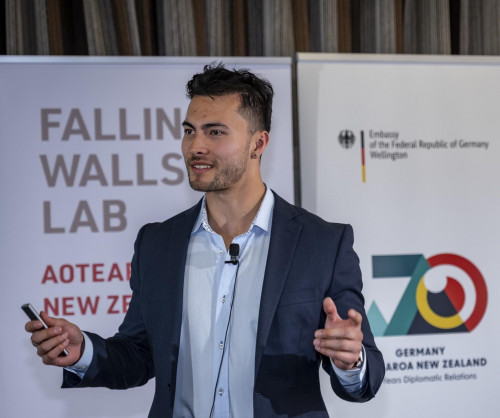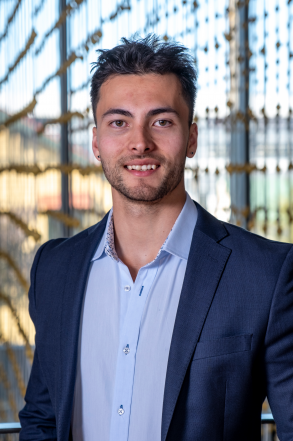News
Published 17 September 2024Wearable tech asthma treatment wins 2024 Falling Walls Lab Aotearoa New Zealand

A pitch about a wearable smart-device to detect and relieve asthma attacks through opening the airways in the lungs with nerve stimulation has won the Falling Walls Lab Aotearoa New Zealand competition.
The co-inventor of the device, Joseph Balfe, told the audience that every day, across the globe, 1000 lives are cut short because of asthma attacks. “The very sad thing is that most of these deaths are actually preventable due to a simple delay in obtaining inhaled medications during the final attack.”
During his pitch, Joseph explained that during a severe asthma attack there is only a small window of time for inhaled medications to reach the lungs.

“You see, when your airways begin to constrict, in a process known as bronchoconstriction, it's only a matter of minutes before the inhaled medications can no longer reach the target areas – the target areas being the deep, smaller airways within the lungs.”
In this context, timing is “absolutely crucial”, Joseph explained. “It becomes a race to beat the obstruction of the airways.”
To address this issue, Joseph and Associate Professor Yusuf Cakmak, at the University of Otago (who recently received the Charles Fleming Senior Scientist Award), invented the VentiMate, an innovative bronchodilator device that is rapid acting and pharmaceutical free. The stimulator/sensor unit is designed to be worn between the shoulder blades.
“Our technology works by non-invasively stimulating the nerve pathway that's responsible for opening the small airways.”
“So far, we've shown in three randomised, placebo-controlled trials that we can prevent exercise-induced bronchoconstriction in healthy humans by non-invasively opening the small airways in real time.”
They are now planning a large-scale clinical trial in people with asthma to clinically validate the technology.
“Our ultimate goal is to develop a device that works as a closed-loop system, meaning that it will continuously monitor for an asthma attack and immediately apply stimulation before it becomes a life-threatening emergency.”
Joseph told the audience that he is one of nearly 600,000 New Zealanders taking inhaled asthma medication. New Zealand has one of the highest rates of asthma in the world and there are 7,000 hospitalisations each year, costing the country $NZ1 billion annually.
Ultimately, Joseph hopes that the technology will be able to provide more equitable access to asthma treatment in New Zealand.
Many of the people who suffer from respiratory problems live in rural areas, and asthma is more prevalent in Māori and Pacific peoples.
“The good thing about a device like this is that nobody has to keep going to the clinic for repeat prescriptions of inhalers. Ideally the device would be rechargeable, and they can wear it the whole time.”
This would hopefully reduce the cost of treatment and allow more equitable access to asthma control, he said.
Trialling the technology himself, Joseph says the neuromodulation creates a pleasant tingling sensation.
 Having recently completed a Master of Science in Neuroscience at the University of Otago, Joseph is now a Clinical Trials Associate at Pacific Edge Ltd., a world-leading cancer diagnostics company specialised in non-invasive genomic urine testing for bladder cancer. He also has a Bachelor of Music in Performance.
Having recently completed a Master of Science in Neuroscience at the University of Otago, Joseph is now a Clinical Trials Associate at Pacific Edge Ltd., a world-leading cancer diagnostics company specialised in non-invasive genomic urine testing for bladder cancer. He also has a Bachelor of Music in Performance.
In awarding him first place in Falling Walls Lab Aotearoa New Zealand, Jury Chair Professor Phil Lester said the wearable asthma treatment device had the potential to be a “major advance” and was “very globally relevant” given the high prevalence of asthma globally. He also complimented Joseph for his “polished, evidence-based presentation”.
Through winning the Lab, Joseph has won the chance to represent the region and compete at the Falling Walls Lab Global Finale in Berlin in November. As part of his prize, EURAXESS Australia & New Zealand will offer him mentoring and science communication training, to make sure he will get the most out of his trip to the Falling Walls Lab and Science Summit in Berlin.
Joseph was selected as the winner from nineteen participants from around Aotearoa New Zealand and the Pacific Islands who pitched their innovative breakthrough ideas.
Royal Society Te Apārangi hosts the Falling Walls Lab Aotearoa New Zealand event, with support from the German Embassy in Wellington, the Ministry of Business, Innovation and Employment (through the Catalyst Fund), and EURAXESS Australia & New Zealand.
Ms Winnie Switakowski, Deputy Head of Mission for the German Embassy, said the Falling Walls initiative got its name from the collapse of the Berlin Wall in 1989 – and November will mark 35 years since the Berlin Wall came down.
Participants at approximately 80 Falling Walls Lab events around the world are all tasked with showcasing their innovative research, scientific idea, or evidence-based initiatives, and explaining how they could make a difference for society in three-minute presentations: which walls will they break through?
Watch Joseph's winning pitch:
